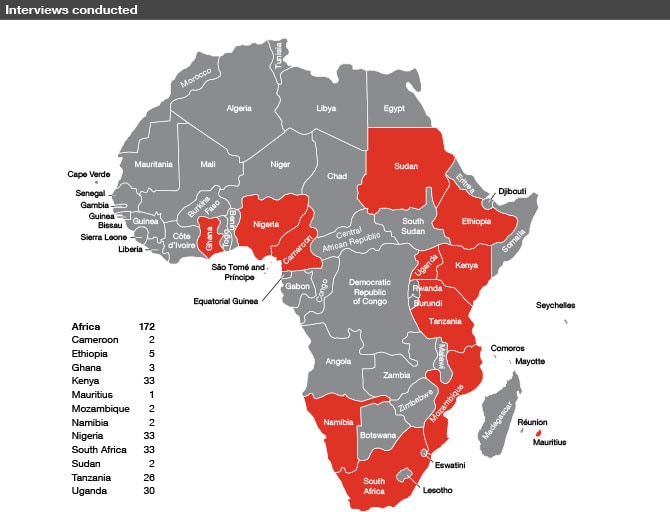African family businesses need to adopt new priorities to secure their legacy
Listen to an AI-generated audio version of the report
hero-image-2
Family Business Survey 2023
The notion of how to build trust in business is changing—fundamentally and rapidly. For everyone—including customers and employees—issues like environmental, social, and governance (ESG) and diversity, equity, and inclusion (DEI) have become litmus tests for trustworthiness. Due to powerful demographic shifts, most of today’s customers and employees hail from generations—millennials and gen Z—whose goals and values differ from those of baby boomers. Family businesses, which for years have relied on a trust premium built up over generations, have been slow to get the message.
At a basic level, the formula for building trust is expanding. Businesses will need to take into account new groups of stakeholders who have different expectations around what builds trust, and who consume information in entirely different ways. When it comes to these new measures for earning trust, family businesses will need to do a much better job of both showing and telling: increasing the visibility of their efforts and communicating them consistently to stakeholders. These are among the key findings from PwC’s Africa Family Business Survey 2023.
Trust has been—and remains—a vital competitive advantage that sets family businesses apart from other companies. The Edelman Trust Barometer confirms that family businesses are trusted more than other businesses: their trust score is six percentage points higher than that of businesses in general. They have, however, been losing their trust advantage when you compare the years 2013 to 2023.

Higher levels of trust can result in better performance, as demonstrated by recent PwC research showing a strong correlation between trust and profitability. Finding ways to protect and nurture that trust premium is essential to achieving the ambitious long-term goals that the survey’s participants say they’re pursuing:
73%
55%
This year’s survey of 172 family business owners in 12 African territories uses a model developed by Sandra Sucher, a Harvard Business School professor of management and the author, with Shalene Gupta, of The Power of Trust, to assess whether family businesses are doing the right things in today’s world to build trust (see the four pillars, below). The results of the survey reveal a disconnect between traditional views about trust and their impact on how family businesses operate today. They also highlight where and how family businesses will need to transform to ensure their legacy.


Family businesses know that the trust of customers and family members is essential, but those businesses need to be more proactive in building trust with their wider key stakeholder groups, especially employees and the general public.

The good news is that trust is tangible and can be systematically built. But if family businesses are to protect their trust advantage, it will require transformation—a reality that many business leaders are already acknowledging. Of the 4,410 executives participating in PwC’s 26th Annual Global CEO Survey, 39% of family business respondents believe their company will not be fit for purpose in ten years if it stays on its current course; a similar percentage of the cohort identifying as family business leaders say the same thing. For sub-Saharan Africa the percentage is 46% and for South Africa, similar to the global 39%.
This means that they will need to change policies and practices, revisit their priorities, and communicate those changes to every stakeholder group and across generations. Our 2022 Africa NextGen Survey of family business leaders–in–waiting showed that they are following their parents’ lead and prioritising growth over ESG as a means to safeguard their legacy. This business focus will need to expand if they want to protect the business as the most important family asset, as 88% noted in this year’s survey.
The expectation that business has societal and political responsibilities is now a consensus view.
Let’s look more closely at what needs to be done to build trust with the three most important stakeholder groups for family businesses: customers, employees and family members.
In coming months, PwC Africa will publish in-depth perspectives.
1. Transform to build trust with your customers
PwC research carried out as part of this year’s Global CEO Survey shows that after industry conditions, levels of consumer trust are the next biggest determinant of performance variance. And under the new trust formula, strong ESG credentials are essential. In PwC’s 2023 Global Consumer Insights Pulse Survey of more than 9,000 consumers in 25 territories, 70% of respondents said they would be willing to pay more for food produced in an ethical way compared with 82% of South African consumers. In the 2022 edition of the survey, half of the consumers said ESG considerations influenced their trust in a company and their decision to recommend it or its brands to others. Gen Z and millennials were substantially more likely to express this opinion.
Capitalising on that kind of trust requires a clear ESG narrative and two-way communication, including channels for customer feedback. And yet, the business owners participating in our 2023 Africa Family Business Survey do not identify ESG issues as a top priority, a circumstance reflected starkly in their responses to key ESG-related questions:
12%
70%
20%
11%
A strong ESG strategy should include the measurement of performance through non-financial as well as financial targets. Diversity matters to the largest cohort of customers as it brings different views, perspectives, and cultural nuances. Family businesses routinely measure growth and customer satisfaction, but only 7% set targets for DEI [Kenya: 9%, Nigeria: 3%, South Africa: 15%], and only three in ten do so for social impact [Kenya: 24%, Nigeria: 42%, South Africa: 39%].
Although there are African differences on issues like ESG and DEI, in no region do family businesses make them top priorities. In Africa, only 12% of family businesses say they have an ESG statement that is communicated to stakeholders. In Nigeria, a mere 6% do versus Kenya’s 15% and South Africa’s 12%. On DEI, the numbers are only slightly better. In Africa, 24% have a clear purpose statement on DEI: in Nigeria, 36% report having one versus Kenya’s 12% and SA’s 18%.
The family businesses that are building trust in these new ways—addressing ESG, DEI and broader public concerns—express more optimism about their prospects For example, 40% of survey respondents who have a strong focus on attracting and retaining talent (a characteristic suggesting heightened awareness of DEI, among other factors) predict strong future growth, compared to 27% who were not prioritising these areas.
Companies have never been subject to as much scrutiny from society as they are now. In the context of global climate and societal challenges, businesses need to demonstrate their ability to create value, build trust and contribute to solving important problems. ' Business as usual', with a sole focus on profitability, has become obsolete.
Read our deep-dive article exploring how to build trust with customers.
2. Transform to build trust with your employees
Trust is built from the inside out; a company won’t be trusted by its customers if it’s not trusted by its employees. According to PwC research, companies that actively create opportunities for their employees to build skills have greater earnings resilience and demonstrate a superior ability to attract and retain talent.
Family businesses understand the importance of employee trust. Two-thirds say it is essential. But when looked at more closely, this conviction is not matched by action: 38% say they have little focus on attracting and retaining talent. Interestingly, being trusted by financial partners/banks is seen as more essential than employees.
According to PwC’s 26th Annual Global CEO Survey, 45% of CEOs in sub-Saharan Africa and 52% globally believe that skills shortages will impact profitability over the next ten years. Many organisations are adopting a liquid model and allowing all employees, regardless of their level or job title, to contribute to the strategy of the organisation and share ideas to drive innovative change.
Ultimately, employee trust depends on three factors:
Purpose and values. This is traditionally where family businesses have excelled—84% say they have a clear purpose, up slightly from when we asked a similar question in the 2018 survey—but the message has not been widely disseminated to stakeholders: only 35% say it’s regularly communicated externally.
Commitment to ESG. In PwC’s 2022 Global Workforce Hopes and Fears Survey of more than 52,000 workers worldwide, 53% of respondents said it’s important that their employer is transparent about the company’s impact on the environment, and 54% said it’s very important that their employer is transparent about its record on DEI. Yet only 41% of family businesses regularly communicate how they are performing against such non-financial indicators.
Accountability. Creating a structure for accountability that allows employees to speak up about their concerns is a good way to help build trust. Of the Africa family business owners surveyed, 65% said they allow employees to appeal or question management decisions. This indicates that Africa is ahead of the rest of the world where only 57% of businesses allow this [Kenya: 67%, Nigeria: 64%, South Africa: 73%]. That means however 35% do not. So here, too, there is room for improvement.
We believe that we should maximise the potential of our people. We believe in giving our employees opportunities where possible and that there is strength in diversity. There are the things that inspire me. Creating a culture of safety enables people to admit their mistakes. You are never going to get everything right. What matters is how you correct your mistakes.
Read our deep-dive article exploring how to build trust with employees.
3. Transform to build trust with your family
Family business leaders understand the need to have trust between their family members, and 77% believe they have built that trust [Kenya: 70%, Nigeria: 71% and South Africa: 84%]. But they also say that conflict within the family has a spill-over effect on building trust across the wider business. Just below one in five respondents say family disagreements are the biggest challenge when building trust with all stakeholders. Other challenges include the current company culture, the inability to change supply chain processes, structures and dependencies and pressure from financial partners to deliver growth/profit.
Dealing with conflict has never been easy for family businesses. It’s part of an ongoing struggle many have with establishing strong family governance structures. In the 2021 edition of the Africa Family Business Survey, only 12% of respondents said they had conflict resolution mechanisms to deal with family disputes. In this year’s survey, that share is only marginally higher, at 21% [Kenya: 21%, Nigeria: 6% and South Africa: 27%]. And only 77% of family business leaders say they have some form of governance structure in place [Kenya: 76%, Nigeria: 58% and South Africa: 94%]. This includes shareholder agreements, family constitutions and protocols, and even wills.
Trust is a willingness to be vulnerable to actions or intentions of others. For example, every time my wife Elna flies with me to our farm she is vulnerable to my actions and responsibility as a pilot. She literally puts her life in my hands. One mistake or mishap form my side could put her life in danger or even worse. It took me many years to build this trust and I can destroy it in a few minutes. The same is true for family members. Trust is built and maintained by small actions over time. It can be destroy in a single word or action. A trust deficit may take long to restore. Trust means relying on a family member because you feel safe with them and have confidence that they will not hurt or treat you with disrespect. To build trust you need to be authentic, apologise, never lie, steal or cheat, keep your promises, and always remember: true love is the winner in all situations and conflicts.
This lack of formal governance has an effect on how the business is run and perceived: strong governance reflects a business’s purpose and values. One outward expression of the way family businesses are falling behind on demonstrating their values is the composition of their boards. Only 11% of those surveyed reported having diverse boards, defined as ones that include two or more women, one board member under the age of 40, one non-family member and one from a different sector background. Interestingly, the average number of members on a family business board is five: two being non-family members and three being family, according to the family businesses surveyed.
Of the African respondents, 33% have no women on the board at all [Kenya: 58%, Nigeria: 10% and South Africa: 45%], and 45% have no one under 40 [Kenya: 42%, Nigeria: 40% and South Africa: 42%]. More than a third of the businesses have boards consisting solely of family members [Kenya: 39%, Nigeria: 41% and South Africa: 27%]. This is a reflection of the finding that DEI is a low priority for family businesses. The board composition of many family businesses represents the past, rather than the present, and certainly not the future.
Read our deep-dive article exploring how to build trust with family members.
Read more on building trust with family members
New ways family businesses can transform to build trust:
Today’s formula for building trust requires a transformative approach, one that may seem unfamiliar to many. The long-held commitment to ‘giving back’ to society through philanthropy will need to be refashioned into well articulated, observable actions centred around the things that matters most to a broader stakeholder group. We consider the following actions to be high priorities.
Establish two-way communication with stakeholders. It’s not enough for family businesses to say they have strong ideals. They must model those ideals in their relationships with internal and external stakeholders, starting with a fair internal system for reporting misbehaviour and a clear feedback mechanism for customers. These are visible solutions that will help to build trust.
Build trust through transparency. Family businesses have become used to keeping a low profile and are often reluctant to share details about their business publicly. But transparency is essential to trust. This means regular public reporting of the company’s ESG and DEI targets, and its performance against those targets. The Pick n Pay Group, for example, which employs over 90,000 people, is committed to sourcing 50% of their cotton as more sustainable cotton by 2024, which includes recycled cotton, organic cotton and Fairtrade cotton. Of their clothing suppliers, 95% are registered on the SEDEX (Supplier Ethical Data Exchange), up from 77% last year. They have specific targets for improving the company’s social and environmental impact.
Speak out on social issues: Family businesses are expected to be more vocal, visible and active than before. Public trust matters, and that means showing that you care about what’s going on in the world. Nestlé was acknowledged by the Bloomberg Gender Equality Index (GEI) for its transparency in gender reporting and enhancing women’s equality. This highlights Nestlé’s efforts in empowering women across its value chain and continuously creating equal opportunities for all its employees, for example. According to the 2021 Global Gender Gap Index, Rwanda and Namibia were in the top ten countries with the highest gender equality in the world. Within Africa, women play a huge role in small-sized/micro family businesses but are invariably excluded from leadership positions in large, internationally active family firms, according to the Women in African family businesses publication.
The message from this year’s survey is clear: family businesses not only need to make transformative changes to build trust, they’ve also got to show and tell—by making their efforts visible and communicating them clearly to their stakeholders. In today’s world, that means not just their customers, employees and family members, but also the public at large.
About the Family Business Survey:
PwC’s Africa Family Business Survey 2023 is an Africa market survey of family businesses. The goal of the survey is to get an understanding of how family business leaders perceive their companies and the business environment. The survey was conducted online in collaboration with the Family Business Network (FBN). The survey conducted 172 interviews in 12 African territories between 20 October 2022 and 22 January 2023. Manufacturing accounts for 40% of the businesses surveyed, and 24% are in consumer goods, with the rest coming from financial services, technology and healthcare, among other industries.

Watch the session recording of our latest virtual event.
Africa Family Business Survey 2023 | Virtual event
Dion Shango, Africa CEO, introduced our panelists, Kallie Schoeman (Managing Director, Schoeman Boerdery, South Africa), Alec Davis (Group Chairman, Davis & Shirtliff, Kenya) and Dr Nadya Zhexembayeva moderated by Esiri Agbeyi (Africa Family Business Leader, Partner, PwC Nigeria)
Dion Shango, Africa CEO, introduced our panelists, Kallie Schoeman (Managing Director, Schoeman Boerdery, South Africa), Alec Davis (Group Chairman, Davis & Shirtliff, Kenya) and Dr Nadya Zhexembayeva moderated by Esiri Agbeyi (Africa Family Business Leader, Partner, PwC Nigeria).

























